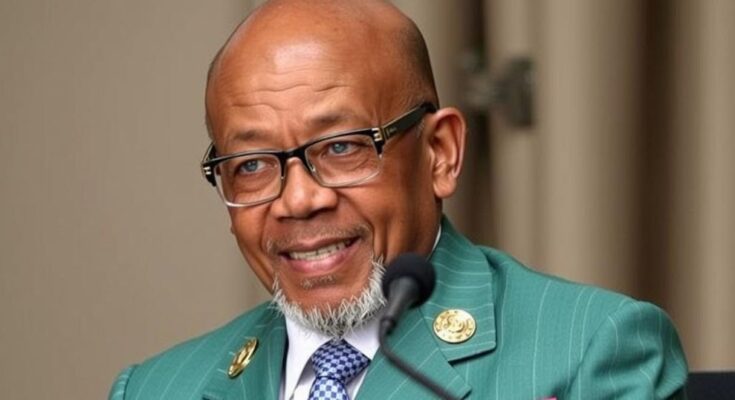Desi Bouterse, former president of Suriname, died at 79 following a short illness, confirmed by sources. He came to power via a military coup in 1980 and faced various legal issues, including a conviction for the 1982 murders of 15 men. His death has prompted gatherings among his supporters, marking a significant moment in Surinamese politics.
Former President of Suriname, Desi Bouterse, has died at the age of 79 after a brief illness, as confirmed by reliable sources. His death reportedly occurred at a secret location, with his body subsequently transported to the capital city of Paramaribo. While his family has not formally announced the news, members of his National Democratic Party (NDP) have gathered to provide mutual support during this time of mourning.
Bouterse rose to power following a military coup on February 25, 1980, which ousted the elected government of Henck Arron. His rule was initially supported by various segments of society, including radical leftist political organizations. Despite having lost in parliamentary elections in 1987, he maintained significant military influence, staging another coup in 1990 against President Ramsewak Shankar.
In the years that followed, Bouterse’s political career fluctuated, experiencing both victories and defeats in various elections, eventually returning to the presidency in 2010. His tenure, however, was marred by serious legal issues; in December 2023, he was convicted in absentia for the 1982 murders of 15 individuals, including prominent journalists and political figures. He was sentenced to 20 years in prison, although he had been evading justice since then, ultimately being placed on the INTERPOL Red Notice list.
Recent police operations aimed at locating him were unsuccessful, reflecting the ongoing tensions surrounding his contentious legacy in Surinamese politics and society. As his party members gather for support, the future of his political influence and the implications of his passing remain uncertain.
Desi Bouterse, a significant figure in Surinamese history, first seized power in a coup in 1980 and ruled through a series of military and electoral shifts over the decades. His regime has been characterized by controversy, particularly regarding his involvement in the 1982 killings of 15 dissenters, which led to a conviction and a subsequent attempt to evade justice. His complex legacy includes a mix of populist support, military influence, and significant legal challenges, and his death marks the end of an era in Surinamese politics that reshaped the nation’s trajectory.
Desi Bouterse’s death at 79 represents a pivotal moment in Surinamese history, as it concludes the life of a controversial leader whose actions and policies have deeply impacted the political landscape. His efforts to maintain power through military intervention and political maneuvering demonstrate the complexities of leadership that often blur legal and ethical lines. The reactions of his supporters and the broader implications for the NDP in upcoming political dynamics will be closely observed in the wake of his passing.
Original Source: www.guardian.co.tt




